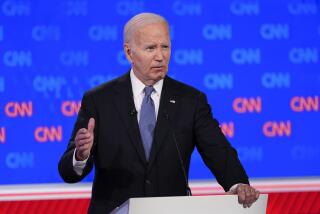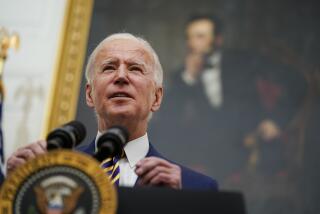Details, Schmetails--Bush’s Avoidance Policy Starts to Rankle
- Share via
WASHINGTON — The topic was the largest tax cut in a generation--by far President Bush’s top priority. Yet the conversation in the White House rarely strayed from superficialities.
Repeatedly, Bush’s guests tried to engage him in a detailed give-and-take about the tax cut’s far-reaching ramifications. But the president deflected virtually every such attempt by the senior Republican members of the congressional budget committee, referring them to his staff. Instead, as he did last week in meetings on energy with California Gov. Gray Davis, he stuck to a gloss-the-details script.
“He’s engaged. But it’s all surface engagement--all kinds of wisecracks, snortling and nicknames,” fumed a Republican senator who participated in the recent budget meeting in the White House Cabinet Room.
George Walker Bush’s reputation as a detail-averse chief executive preceded his inauguration as America’s 43rd president. But his hands-off management style is beginning to rankle as his administration wades into a thicket of policy controversies after a well-received, getting-to-know-you phase.
Even some congressional Republicans who wish Bush well are warning that he is unlikely to get much more of his agenda through Congress unless he can demonstrate a firmer grasp of details, especially now that Democrats are poised to retake control of the Senate and offer a competing agenda.
Sen. Charles Hagel (R-Neb.), for instance, went public with his concerns recently, telling a national TV audience:
“The president must learn. He is going to engage--must engage--more personally. That means he’s going to have to understand issues better, more deeply, get himself immersed in this.”
A senior White House communications staffer did not respond to requests for an interview on the subject.
After Bush held a one-on-one session in Los Angeles with Davis recently on California’s utility crisis, some in the room had the same reaction, remarking that Bush didn’t seem up to date on the problem in general and especially certain actions taken by the Federal Energy Regulatory Commission.
One meeting observer said the president in private sounded the same as in public. “It was like he was on script,” said the aide, who asked not to be named.
At other times, the president has seemed plain uninterested in detailed policy discussions, as Sen. Ben Nelson (D-Neb.) learned during a Feb. 28 flight aboard Air Force One from Pittsburgh to Omaha. At the time, Nelson harbored serious doubts about Bush’s budget and $1.6-trillion tax cut proposal.
But during that two-hour, five-minute flight, not once did the president broach the matter.
“I was prepared to talk about it. But he just didn’t bring it up,” Nelson recalled. Instead, Vice President Dick Cheney and other top White House aides later lobbied him. Nelson ended up voting for both the budget and the tax cut.
Another person who was struck by Bush’s lack of involvement was a top aide to a Democratic senator who is a leader on education issues.
“The president has been nowhere to be seen on the education bill,” he said. “There’s been no outreach to the Senate,” which is expected to take up the House-passed bill this week.
Such bafflement in Washington does not surprise political observers in Texas, where Bush served for six years as governor.
“He’s never been known for his focus on detail or deep involvement in policy-level decision-making,” said state Rep. Elliott Naishtat, a Democrat. “It’s a conscious choice on his part to not get involved. But whether or not it has anything to do with his grasp of issues is difficult to say.”
In many ways, Bush’s approach is reminiscent of another famous delegator: former President Reagan.
“[Bush’s] modus operandi is to be chairman of the board,” said Republican lobbyist Tom Korologos, a onetime White House aide in the Nixon administration.
“He has these operating companies out there--called Defense, called Health and Human Services, called Agriculture. And they function according to the boss’ wishes and goals and visions.”
But inattention to details is precisely what got Reagan in trouble, said Fred I. Greenstein, a leadership expert at Princeton University’s Woodrow Wilson School, citing the Iran-contra scandal.
Greenstein said he was especially troubled by the way the White House developed Bush’s national energy plan.
“The buck stopped in meetings that Cheney was in charge of, not in the Oval Office,” he said.
In the days since Sen. James M. Jeffords of Vermont announced he was defecting from the GOP to become an independent, Bush has displayed a new determination to reach across the partisan divide--as he did in the first days of his presidency, and again Friday in Boston by attending the funeral service for Rep. John Joseph Moakley (D-Mass.), a liberal icon.
But Hagel and others said Bush’s much-heralded back-slapping, nickname-conferring style can go only so far. Now he must put some oomph behind his symbolic acts and casual chatter, they said.
Some longtime Bush watchers believe he can pull it off.
“It’s not his first choice to be a diligent student or to really bear down,” said Bruce Buchanan, a University of Texas presidential historian.
“But as he has shown in the past, when push really comes to shove and he needs to demonstrate his mastery, he will do so,” added Buchanan, citing Bush’s intense preparations in 2000 for a debate against his Democratic rival, Vice President Al Gore, on foreign policy, one of Bush’s perceived weak spots.
Greenstein agreed, citing Bush’s comeback after losing the New Hampshire GOP primary last year to Sen. John McCain (R-Ariz.). “We’ve seen signs of Bush pulling up his socks, digging in harder and becoming more assertive,” he said.
“Bush has a long pattern of intellectual laxness. But he’s got the gray cells. There’s no void between his ears.”
In the coming months, Bush must begin courting key members of Congress--of both parties--one at a time, advised one conservative Midwestern Republican senator, speaking on the condition of anonymity. At the same time, he added, the president must pay attention to policy details.
“He can’t selectively pick what areas, what issues he wants to engage in and what not to engage in,” this senator said.
“Yes, it’s cursory fun to have a discussion of baseball scores and Aunt Millie and say what a cute tie you have and have cookies and tea.
“The president’s got to know what he’s talking about. It’s not good enough just to bring smart people around you.”
Above all, this senator continued, Bush must forge relationships that are based on substance.
“Relationships can’t be built on eating popcorn and talking baseball,” said the senator. “If you don’t develop relationships tied to substance, then you don’t have very much.”
More to Read
Get the L.A. Times Politics newsletter
Deeply reported insights into legislation, politics and policy from Sacramento, Washington and beyond. In your inbox twice per week.
You may occasionally receive promotional content from the Los Angeles Times.










